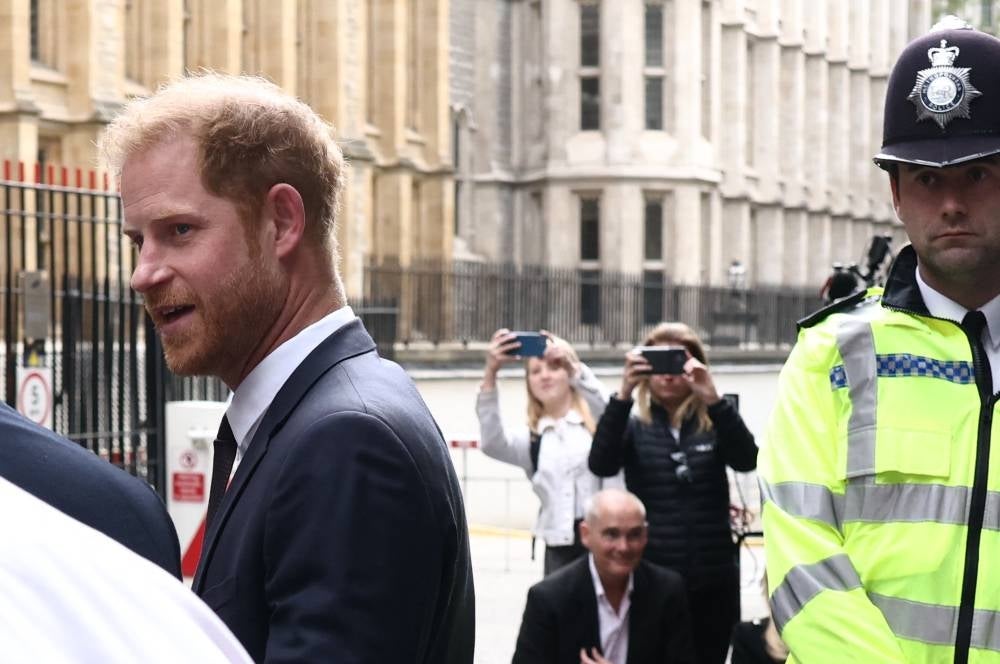Judge told Harry's visa responses on drugs could question integrity
07 Jun 2023 12:36pm

Britain's Prince Harry, Duke of Sussex, leaves from the Royal Courts of Justice, Britain's High Court, in central London on June 6, 2023 - AFP
A
A
A
The Duke of Sussex's reference to taking cocaine, marijuana and psychedelic mushrooms in his memoir Spare prompted a conservative Washington DC think tank to question why he was allowed into the US in 2020.
The Heritage Foundation brought the lawsuit against the US Department for Homeland Security (DHS) after a Freedom of Information Act request was rejected - claiming it was of "immense public interest".
Speaking after the first Federal court hearing in the case, Dr Nile Gardiner, from the think tank, told reporters the lawsuit was about holding a high-profile figure and the US government to account.
"At the end of the day, this is about accountability, transparency and openness on behalf of the US administration with regard to an immigration application by a high-profile individual," Dr Gardiner said.
During the hearing at the federal court in Washington on Wednesday, the lawyer for the think tank, Samuel Dewey, told a judge their case was about the Duke of Sussex, but also about the DHS's "compliance with the law".
Dewey told Judge Carl Nichols the matter had received "widespread and exceptional media attention" which has prompted "questions about government integrity".
After the hearing, Dewey told reporters: "The interest here is in the drug question. Stuff that's unrelated, we would expect them to redact and we're fine with that. We're not on a voyeuristic fishing expedition here."
DHS's lawyer, John Bardo, argued that articles put forward by the think tank in support of their lawsuit were not from "mainstream media" and had failed to point to any wrongdoing by the US government.
In his controversial memoir, the duke said cocaine "didn't do anything for me", adding: "Marijuana is different, that actually really did help me."
The Heritage Foundation's lawsuit argues that US law "generally renders such a person inadmissible for entry" to the country.
It comes as Harry has been giving evidence at the High Court in the UK in his claim against Mirror Group Newspapers over alleged unlawful information gathering.
After the hearing, Dr Gardiner said the duke had become a "household name" in the US, adding: "He is actively engaged on a number of causes, has done multiple high-profile interviews, has taken part in a Netflix documentary that's been watched by tens of millions of Americans - so he's a big figure."
Addressing why the think tank had brought the case, he told reporters: "This is really ultimately about US immigration law, ensuring that it is applied fairly and equally to everybody.
"No one should be above the law and no one should receive preferential treatment.
"In light of Prince Harry's extensive illegal drug use, we believe he should be held to account with regard to his application.
"He's put it all out there, let's see whether that exactly matches what he put on his immigration application.
"Because if it doesn't, that's perjury and that's a criminal offence, and everyone should be held to account before the law - no one should be treated any differently."
On Wednesday, the Heritage Foundation attempted to seek a preliminary injunction - meaning they wanted to compel all relevant sections of the DHS to respond to their Freedom of Information Act (FOIA) request over the duke's immigration papers.
Judge Nichols was told one section was yet to respond, meaning the court could not deal with arguments over whether specific information should be released.
The judge gave DHS a week to indicate whether it would be willing to respond to, or expedite, the request for information by the think tank - BERNAMA














